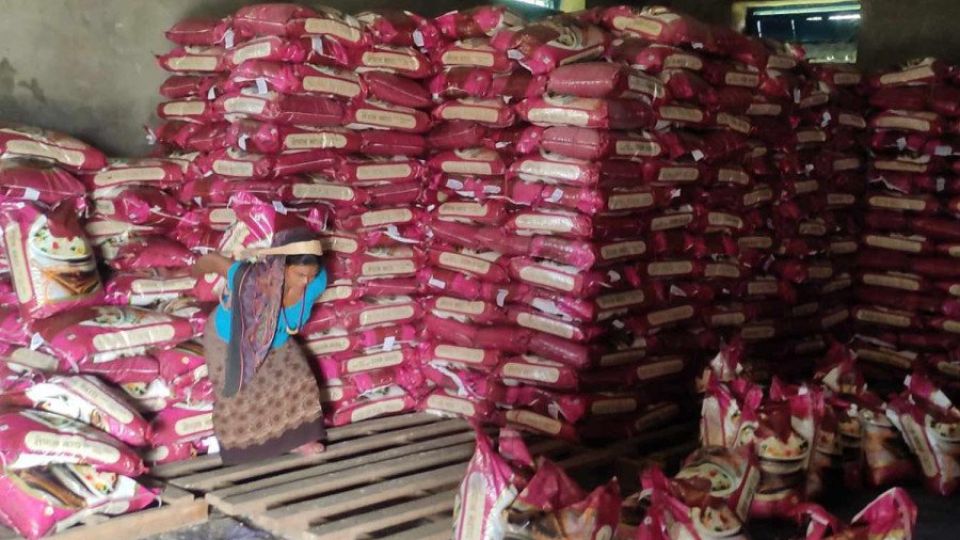December 5, 2023
KATHMANDU – The Food Management and Trading Company Limited in Gorkha has finally started supplying rice to the northern villages of the district, four months into the current fiscal year (2023-24).
The Gorkha branch of the company started transporting the subsidised rice to the Sirdibas-based Philim depot in Chumnubri Rural Municipality-3. According to Shiva Sunar, information officer of the Food Management and Trading Company Limited in Gorkha, a total of 67 quintals of Steam Jeera Masino rice was sent to Sirdibas on Saturday and Sunday.
The transport company, Dudhpokhari Construction Service, has the contract to transport subsidised rice to Sirdibas for the current fiscal year. According to Sunar, the rice was taken up to the Dobhan area by truck and then ferried by mules to Sirdibas. The Philim depot has been selling the rice transported in the last fiscal year in small quantities due the lack of fresh supply.
The subsidised rice quota for the Philim depot in Sirdibas has been set at 2,000 quintals for the current fiscal year. According to Sunar, 1,000 quintals of rice should be supplied each from the Gorkha depot and the Bimalnagar depot of the Food Management Company in Tanahun.
As many as 500 quintals of subsidised rice have been approved for each of the Machhakhola depot of Dharche Rural Municipality, Namrung distribution centre of Chumnubri-4 and Chumling distribution centre of Chumnubri-6 for the current fiscal year.
“We have started supplying rice to the Philim depot of Sirdibas. We are preparing to supply it to Namrung and Chumling distribution centres within a week or two,” said Sunar.
Dudhpokhari Construction Service is responsible for the transport of subsidised rice to the Philim depot and the Namrung distribution centre while Ghale Construction Company has been entrusted with supplying rice to the Chumling distribution centre and the Machhakhola depot.
Every year, the northern settlements of Gorkha including Chhekampar, Chumchet, Sirdibas, Lho, Prok, Bihi and Samagaun often reel under food shortages. The area is yet to be connected to the national road network and the local food production is insufficient. Wheat, barley, buckwheat and potato are grown in the area but the local yield is insufficient for the population.
The government has been selling rice in the food-insecure northern villages of the district at a subsidised rate. However, transport of the allocated quotas of subsidised rice is often delayed, causing hardships to the locals. The food company often argues that the supply is delayed due to the bidding process. The company, however, claimed that the set quotas of rice will be transported to the respective depots and distribution centres on time this year.
The company’s godown in Gorkha Bazaar sells Sona Mansuli Rice at Rs54 per kg and Steam Jeera Masino at Rs86 per kg. The same quantity of Sona Mansuli and Steam Jeera Masino rice costs Rs56 and Rs88 respectively at the Philim depot of Sirdibas.
The rice used to be sold from the Philim depot in Sirdibas for the residents of Chhekampar, Chumchet, Sirdibas, Lho, Prok, Bihi and Samagaun as well. Chhekampar is a day’s walk from Sirdibas while it takes two days to reach Samagaun, which borders China. Food distribution centres in Namrung and Chumling were set up in June as per the demand of the residents of the remote settlements.
However, locals have stopped buying subsidised rice from Machhakhola depot, which is supposed to sell it to the residents of Dharche Rural Municipality, as local traders have been selling the same quality of rice at a cheaper rate.
The depot had no shortage of customers until a few years ago when Machhakhola did not have a motor road and goods were transported by mules and porters. Prices of foodstuffs were costlier at the time due to high transport fees, and most people in the region bought rice from the depot at a subsidised rate. But with the opening of a motorable track some four years ago, prices of daily essentials fell to the normal level in Machhakhola.


